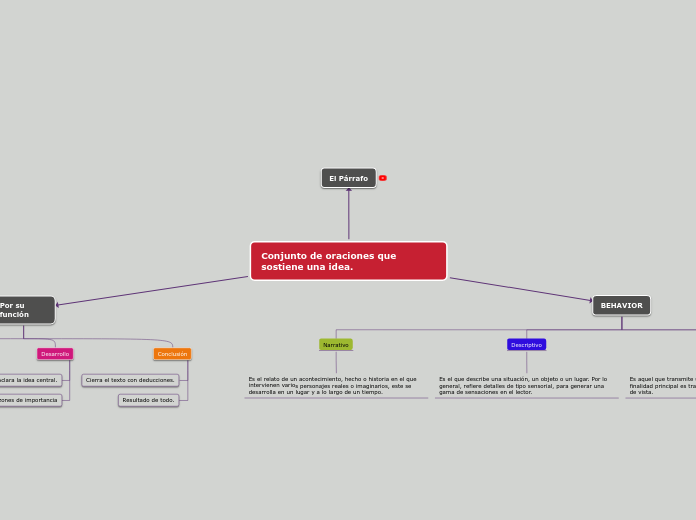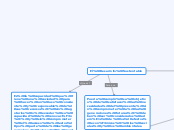Conjunto de oraciones que sostiene una idea.
Name the character
Type in the name of the character whose change throughout the story you are going to analyze.
Example: Nick Carraway.
BEHAVIOR
Character's behavior
Think of the character's behavior at the beginning of the story and look for the way it changed throughout the story.
Argumentativo
El emisor planteará una tesis o hipótesis que será demostrada y justificada en el desarrollo de otros párrafos.
Expositivo
Es aquel que transmite una información concreta; es decir, su finalidad principal es transmitir un conocimiento y no un punto de vista.
Descriptivo
Es el que describe una situación, un objeto o un lugar. Por lo general, refiere detalles de tipo sensorial, para generar una gama de sensaciones en el lector.
Narrativo
Es el relato de un acontecimiento, hecho o historia en el que intervienen varios personajes reales o imaginarios, este se desarrolla en un lugar y a lo largo de un tiempo.
Por su función
Character's feelings
Focus on the way the character's feelings are presented at the beginning and at the end of the story, while explaining why they have changed.
Conclusión
Resultado de todo.
The reason for the change of feelings
Why did the character change his feelings? Type in the answer.
Example: the East lost its appeal due to the shallowness, carelessness and corruption.
Cierra el texto con deducciones.
The reason for the change of feelings
What caused the character to change the first belief you mentioned? Type in the reason for the change.
Example: disgust towards the lack of morality in the Buchanan family.
Desarrollo
Da varias razones de importancia
Change of feelings
How did the character change the belief you mentioned?
Type in a relevant quote for his change.
Example: 'Winter night and the real snow, our snow(...)We drew in deep breaths of it . . . unutterably aware of our identity with this country for one strange hour before we melted indistinguishably into it again. That's my middle-west.' - Nick on the purity and integrity of Midwest.
Aclara la idea central.
Change of feelings
In what way did the character change the feeling you mentioned?
Type in a quote to support your statement.
Example: 'They are a rotten crowd. You're worth the whole damn bunch put together.' - Nick criticizing the Buchanans.
Introducción
Proporciona una idea clara.
Initial feelings
What was the character's initial belief? Type in a relevant quote.
Example: 'seems like the ragged edge of the universe' - Nick talking about Midwest, the place where he grew up.
Inicia el texto.
Initial feelings
How does the character feel about a certain subject at the beginning of the story? Type in a relevant quote to support your statement.
Example: "Reserving judgements is a matter of infinite hope."
El Párrafo
Title
Type in the title and author of the literary work that introduces the character.
Example: The Great Gatsby, by F. Scott Fitzgerald.









